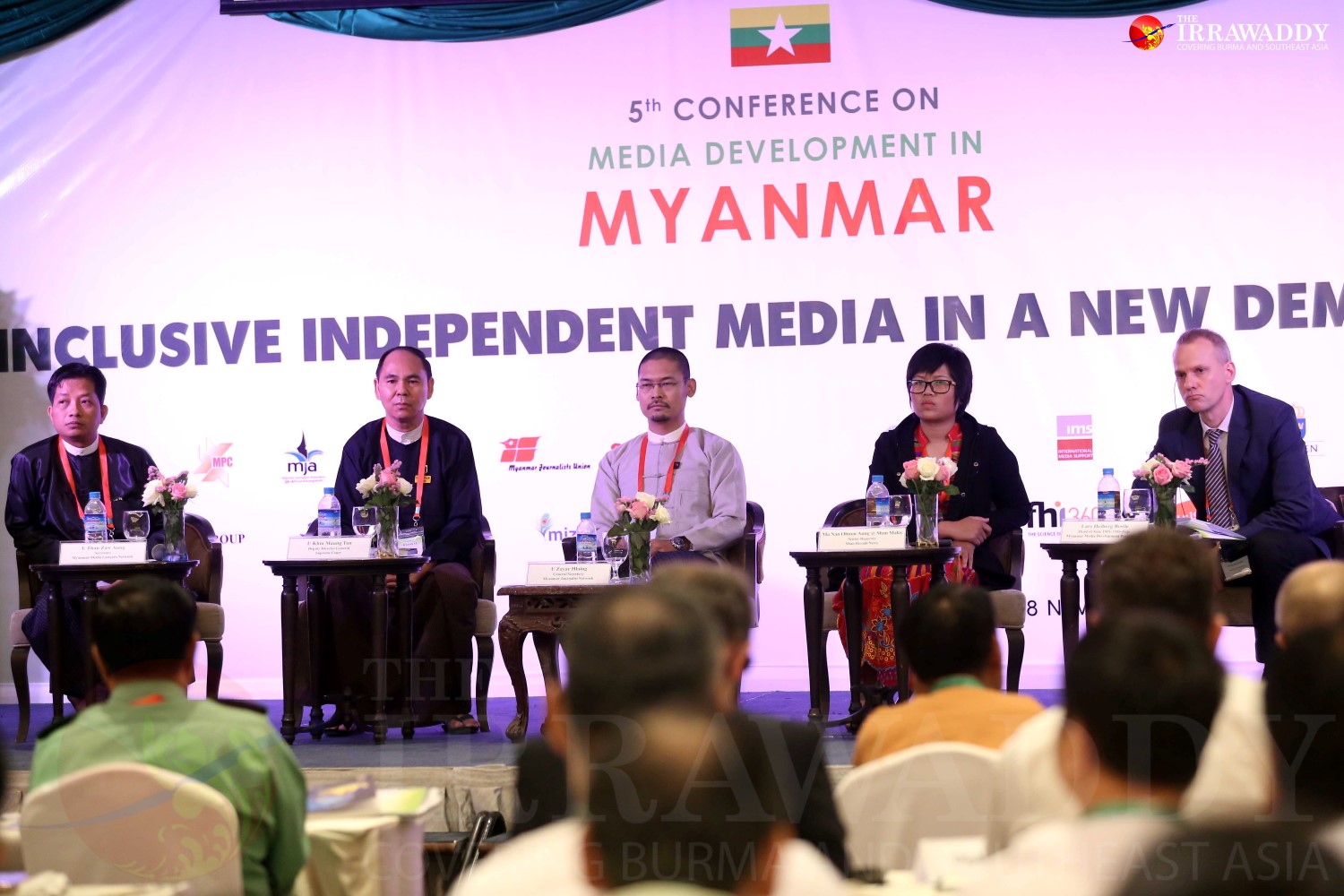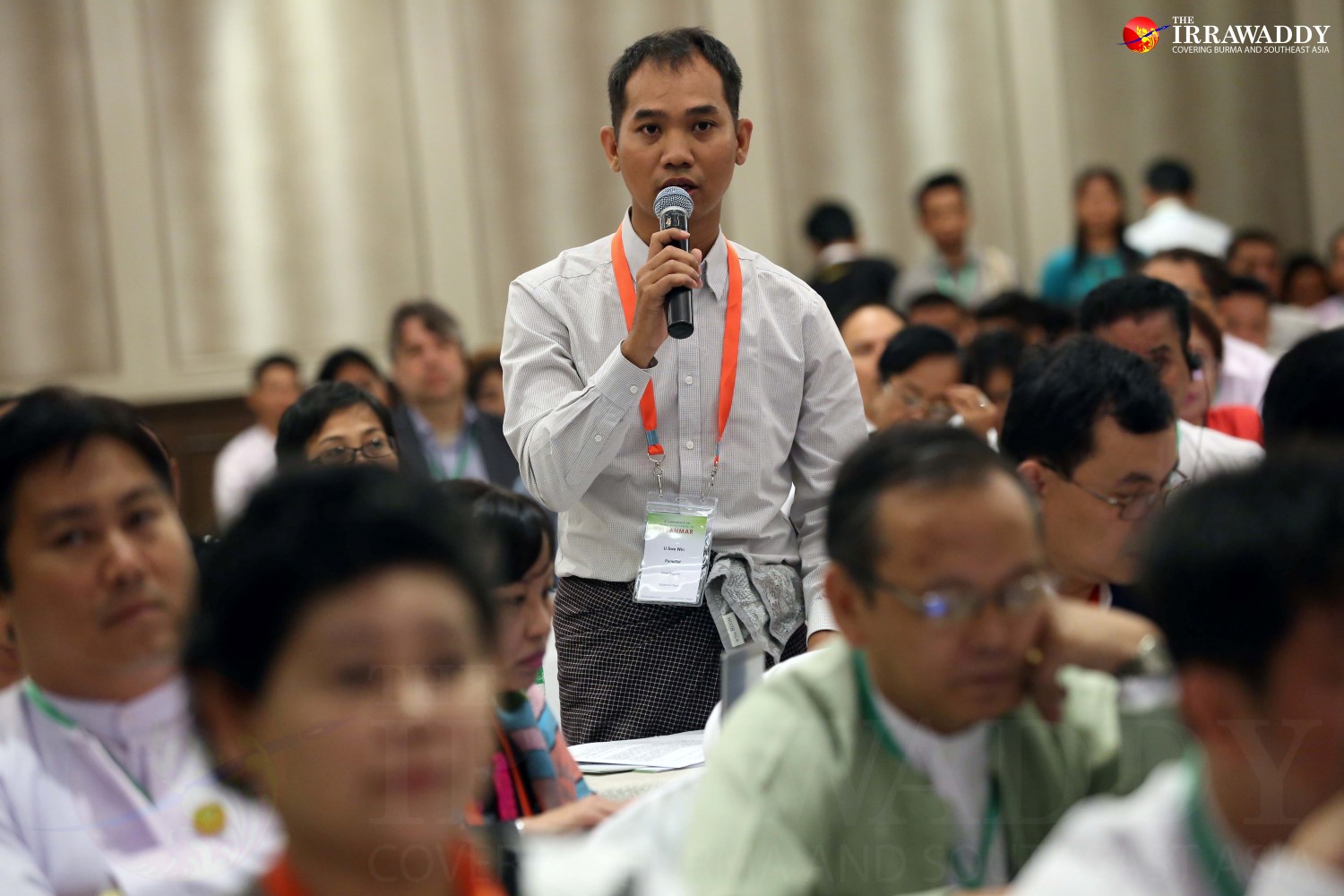RANGOON – At the fifth media development conference in Rangoon on Monday, experts criticized the National League for Democracy (NLD) government over restricted access to information for independent media houses and continued market domination of state-run publications—the main competitors for private newspapers.
Around 300 participants, including representatives from Parliament, the military, and local and international media groups are participating in the two-day event, entitled “Inclusive Independent Media in a New Democracy” and hosted at the Chatrium Hotel. Information minister U Pe Myint was also in attendance.
In his opening speech, Myanmar Journalism Institute’s board of directors member U Thiha Saw highlighted the practices of neighboring Bangladesh’s media contact mechanisms within government: every ministry has a designated spokesperson, and the administration does not operate its own publications.
“Although legal frameworks have been enacted [in Burma], many challenges remain regarding the right to information. I would like to urge the army’s representatives and lawmakers to put in more effort to make a change,” he said.
Other challenges raised included those faced by ethnic minority media outlets, whose journalists have faced defamation charges from the government, which are met with penalties of prison time and fines.
Financial problems also abound: around five privately printed daily and weekly papers have had to shut down in the last year due to such issues.

State-Run Media
The process of media reform was initiated during the era of ex-president U Thein Sein’s government. In 2012, Burma’s censorship board was abolished and several exiled media organizations were allowed to operate within the country.
Current information minister U Pe Myint served as vice chairman of the Myanmar Press Council during Thein Sein’s term in office. At that time, he was perceived as a figure supporting local journalists in the face of media restrictions. After the NLD took office earlier in 2016, he was appointed to his current role within government—the head of the institution responsible for the operation of state-run media.
At the fourth media conference in 2015, media experts demanded that former information minister U Ye Htut do away with the Ministry of Information (MoI), including its several media enterprises.
He told reporters that the future of the MoI would depend on the new government, adding that he hoped they would consider the careers and livelihoods of the ministry’s 7,000 staff members, 3,000 of whom work for state-run newspapers and broadcasters.
U Ye Htut also said that the three primary government mouthpieces—the Global New Light of Myanmar, The Mirror and Myanmar Radio Television (MRTV)—earn US$1 million in profit annually for the MoI.
Seven months into the new NLD government’s term, hopes are dimming that such a change will be carried out under their administration. Myanmar Press Council member U Myint Kyaw said that a timeline should be announced for halting the publication of state-run media outlets, which he described as propaganda mechanisms rather than critical news sources.
In recent months, current information minister U Pe Myint has said that the civilian-led government still requires its own newspapers, in order to inform the public of their work.
Myanmar Journalism Network general secretary U Zayar Hlaing pointed out that one paper would be sufficient to release information or statements, and that the presence of multiple publications loses credibility with readers. This was echoed by Myint Kyaw, who said the print publications in particular—as opposed to the broadcasters—were unnecessary.
“I think they should review whether these actions are effective or not,” said U Zayar Hlaing.

Looking Back at Demands
In early May 2016, U Pe Myint attended a commemoration for World Press Freedom Day and made three public promises: to limit state-run dailies to three pages, to collaborate with media representatives to amend relevant laws, and to create communication officers for every government ministry within three months.
Six months later, observers point out that none of these matters have been successfully implemented. State-run dailies did not decrease their advertising content, laws regarding media have not been proposed to Parliament, and journalists continue to face information blackouts even with spokespeople appointed to ministries.
U Zayar Hlaing told The Irrawaddy that one spokesperson per ministry was not sufficient to meet information demands, and that a staff of around 20 was needed in order to collect and consolidate data and to assist the spokesperson. He also pointed out that under the NLD government, ministries which had once stood alone had since been combined or had converged, creating additional challenges for spokespeople in their communication with media.
At Monday’s conference session, U Pe Myint admitted that inconveniences remain, but reminded journalists that these things “will take time to change.”
















